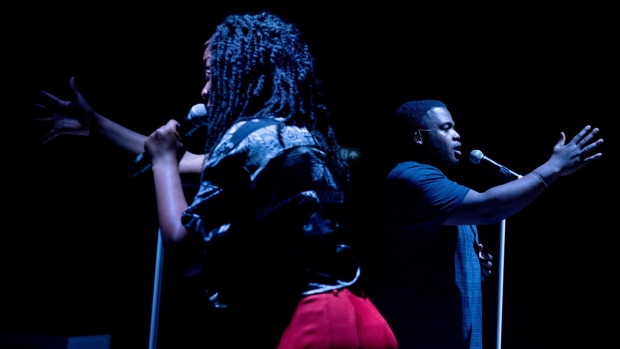Black Love at the Kiln Theatre – review
After it premiered last year, this new musical transfers to the Kiln in north London

© Camilla Greenwell
Whether it's human beings, modes of behaviour, or stage productions, putting labels on things can be counterproductive. Exemplifying this, Chinonyerem Odimba's stimulating piece is described as a musical yet repeatedly confounds expectations of what that theatrical genre does, in the same way that her leading characters (young Black siblings Orion and Roo, sharing a home after the death of their much missed mother) often don't behave in ways one might have predicted.
They share grief and co-dependence but also clearly a lot of genuine mutual affection. Orion is an aspiring actor, constantly fighting against the audition room expectations of what a young Black man brings to the table (these sections, as impressively performed by Nathan Queeley-Dennis, are toe-curlingly well observed) and similarly Odimba's script feels as though it's ripping up the rule book on playmaking. Unsurprisingly, the lived Black experience can't be neatly encapsulated into a streamlined 90 minutes of stage time, and Odimba doesn't attempt to do that, instead giving us a piece that challenges as much as it entertains: Black Love is messy, ambitious, raucous, frequently deeply moving and, at times, undeniably self-indulgent. It doesn't offer a coherency so much as a series of snapshots into these young people's urban lives.
Author and director Odimba is also a poet, and the text truly soars in the beautiful, heartfelt odes to female Blackness, delivered with hypnotic passion by Nicholle Cherrie's captivating Roo, that punctuate the evening. Odimba also creates cracking, edgy comedy as Roo and Orion's united front is threatened by the latter's fledgling relationship with Lois, a young white woman whose tone deaf attempts to be accepted into the fold smack uncomfortably of cultural appropriation bordering on downright racism.
The writing of that character, despite Beth Elliott's valiant attempts to redeem her, is a major weak spot: she's less a rounded human being and more an irritating amalgamation of offensive attitudes and girly tropes. In a coruscating last act showdown between Roo and Lois, it's Roo who gets all the best lines and cogent viewpoints which is fine but would be far more interesting dramatically if Lois had some agency and was less of a negative cypher.
Roo's full name is Aurora: the siblings are named after constellations, and Cherrie and Queeley-Dennis deliver suitably starry performances: they're a lovely team, credible as sister and brother, and fully inhabiting the flaws and foibles of this likeable, sometimes spiky pair. They also field strong singing voices, although tellingly it's during spoken sections that the characters really blaze into life. There's a heart-catching section where they simultaneously recount contrasting childhood stories, but it's Roo's recollection of her first realisation as a small child that a grown-up white woman is seeing her as nothing more than her skin colour, that really lingers in the mind.
Ben and Max Ringham's moderately upbeat compositions are easy on the ear but lack much in the way of distinguishing features. Despite the tartness of some of Odimba's lyrics and the conviction of the song delivery from all three cast members, the tunes too often sound like something one might hear in an elevator, and seldom feel worth interrupting the more interesting family drama and powerplay for.
The show is staged in the round and Richard Kent's set design of modish home comforts bordered by free-standing mics and whited-out loudspeakers suggests a safe space that could easily become a living prison. Richard Howell's lighting and Joel Price's sound effects cleverly reflect a modern world where bewildering confusion threatens to break through the calm at any point. Celise Hicks's choreography is dynamic and expressive but feels a tad overused, and Odimba's production as a whole would benefit from a greater sense of urgency.
Despite the flaws, and the overriding impression of this still being a work-in-progress, Black Love is a refreshingly original piece of theatre, provocative but suffused with affection. It's a celebration and a cry of pain, and it's not like anything else currently on any London stage.












